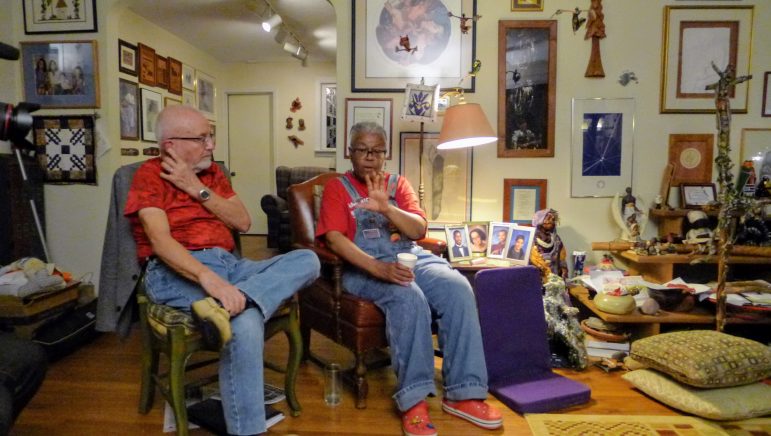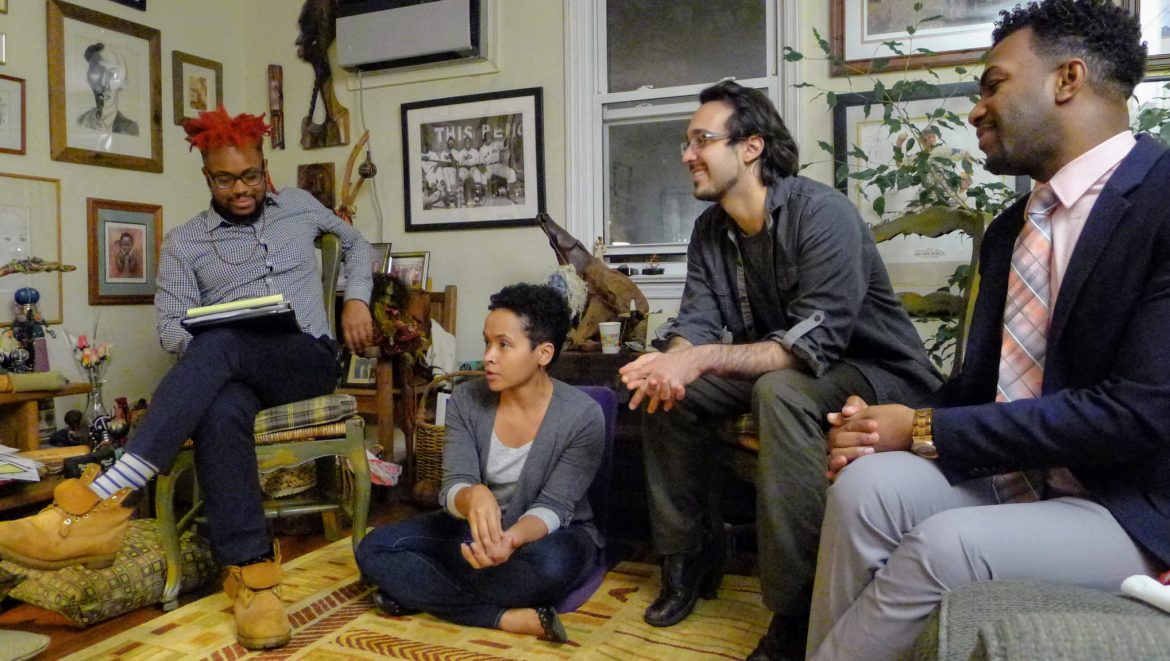New Jersey needs a leader in its next governor, someone who can help influence national politics and change rhetoric around major issues facing the state, agreed a group of Atlantic County residents. The small group, who met at a home in Pleasantville earlier this month to share a meal and talk about their hopes for next month’s election, also found the current candidates to be lacking in leadership characteristics.
Why is that? Both generations represented in the room were quick to point the finger at “pay to play,” which they said favors candidates produced by a political machine, rather than those chosen for their personalities or leadership skills. This is a problem because it leads to gubernatorial candidates that struggle to take New Jersey’s issues to the national stage, the dinner guests said.
“I want the state of New Jersey to become more vocal..from a gubernatorial standpoint,” said Belinda Manning, a retiree who lives in Pleasantville and is active in various Atlantic City community organizations.
This discussion was organized and recorded as part of Voting Block, a collaborative reporting series looking at the issues that New Jersey communities want to see addressed by the next governor (you can find more from around New Jersey at VotingBlockNJ.com.) You can also listen to an edited audio version of the discussion as a podcast here and via your favorite podcast app:
Current gubernatorial candidates Kim Guadagno (Repbulican) and Phil Murphy (Democrat) seem to be doing little to shake much of the voting population from apathy, even though next month’s election is the first opportunity in 12 years to choose a governor without an incumbent in the race. Voter apathy is a consequence of a political system that values candidates’ ability to raise funds above other characteristics, the guests said.

David Bowman and Belinda Manning
“New Jersey doesn’t really put a lot of currency on popularity in politics,” said Mike Nees, a Stockton University graduate now living in Atlantic City.
“So much of our political fortunes are determined by the pay-to-play machinery that churns out winners and losers,” Nees said. “You have to satisfy very specific party bosses in very specific regions to ascend and that means to be as bland, policy-wise, as possible.”
The Pleasantville Voting Block attendees agreed that they would all vote next month, even though none were particularly enthusiastic about the candidates. Fighting apathy, however, was important to the group and it was one of the issues that they put on a list for the next governor to address.
Watch a video of the discussion, filmed by Media Mobilizing Project, here:
“We have a generation right now that is more caught up on just the moment,” said Marques Johnson, who had recently returned to Atlantic County after a period living in New York. “This is a generation that doesn’t feel heard and … this disengagement is what’s costing our communities,” he added.
Manning, however, said that she thinks her generation is also apathetic. “I don’t think it’s just the younger generation,” she said. “I think people have become so disengaged in the political structure and their ability to make any change in that structure.”
Here are some of the other issues that the group said they want the next New Jersey governor to put on his agenda:
1. Jobs
Atlantic County has made headlines for its high rate of foreclosures, after the financial crisis was followed by Superstorm Sandy and a wave of casino closures. The county’s population has been shrinking as residents have left in search of jobs. Dione Carroll said she wants the next governor to know that residents want jobs. “We are not lacking for the drive to work,” she said. Carroll said she wants the future governor to help revive the fortunes of Atlantic City as a resort town – just not one dependent on casinos.
2. Legalizing Marijuana
The group discussed the knock-on effects of excluding individuals with marijuana charges from housing and other services, creating an underclass that struggles to find and hold jobs. “It’s important that our local government understands how this is affecting communities and they need to not be afraid to push an agenda that’s going to help us in the right way,” said Johnson. Several attendees were in favor of following Colorado’s lead in legalizing marijuana. “We legalized gambling, I don’t see we couldn’t be a resort for other things that Colorado has seen amazing returns on,” said Carroll.
3. Education
The group broadly agreed that there should be a fresh look at how the education system is funded. “Our most valuable asset is our young people,” said Travis Love, who was born and raised in Atlantic City but now lives in Newark. Love said that when schools are devalued, young people will consequently feel devalued. “It’s time that we look at how we fund education in our state,” he said. Cities such as Pleasantville and Atlantic City have seen a decrease in school funding as local property taxes have been eroded by foreclosures in the area. “There has to be a better way to fund our public school systems,” said David Bowman. “I’d like to see the next governor put more emphasis on our public school systems and fund it from a broader base than property taxes.”
4. Immigration
Atlantic County’s casino and tourism industry has drawn immigrants for decades. Manning said she would like the next governor to know how diverse the community is. “Most of my community is latinos, some are undocumented,” she said. “They need to feel safe, they need to be able to work, they need to be able to get valid drivers licenses, so that they can work (and) so that they can get insurance on the cars that they sometimes have to drive without licenses and without insurance because they are fearful.” Manning said she would like these members of her community to be able to participate as full citizens.
5. Activism Is Here To Stay
The younger members of the group said they also want the next governor to know that the electorate will be holding him or her accountable for their actions. “They should know that we are no longer just going to be bystanders,” said Johnson. “We are going to be engaged, actively involved in making sure that we hold ourselves accountable for holding them accountable.” Nees added that the next governor should be aware that movements such as Occupy Wall Street and Black Lives Matter were not just a one off. “That’s the kind of power that we’re supposed to have in a democracy,” he said. “We can vote you out on this.”
6. We Need Rhetoric Change
Outgoing Gov. Chris Christie frequently had public employees in his sights and, as a consequence, public service has become anathema in New Jersey. Public-funded work has become “toxic,” said Nees. Manning said that the next governor will have to address this. “Whether you’re talking about teachers or any other unionized public part of the workforce – don’t dehumanize them, which is what has happened in the past,” she said.
“I would like to see a governor start to mend some of those fences and just give them a break and just stop bashing and causing divisions,” she said. “I want the rhetoric to change.”
This story is part of the Voting Block series and was produced in collaboration with The Record, NJ Spotlight, WHYY, WNYC, Reveal from The Center for Investigative Reporting, the Center for Cooperative Media and New America Media. To read all the stories in this series, visit VotingBlockNJ.com.
